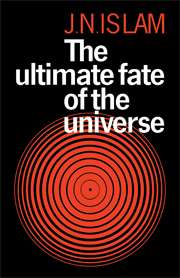Book contents
- Frontmatter
- Contents
- Preface
- Dedication
- Note on some conventions
- 1 Introduction
- 2 Our Galaxy
- 3 The large-scale structure of the universe
- 4 Elementary particles – a preliminary look
- 5 Is the universe open or closed?
- 6 Three ways for a star to die
- 7 Black holes and quasars
- 8 Galactic and supergalactic black holes
- 9 A black hole is not forever
- 10 Slow and subtle changes
- 11 Future of life and civilization
- 12 A collapsing universe
- 13 The steady state theory
- 14 The stability of the proton
- 15 Epilogue
- Glossary
- Selected bibliography
- Index
- Frontmatter
- Contents
- Preface
- Dedication
- Note on some conventions
- 1 Introduction
- 2 Our Galaxy
- 3 The large-scale structure of the universe
- 4 Elementary particles – a preliminary look
- 5 Is the universe open or closed?
- 6 Three ways for a star to die
- 7 Black holes and quasars
- 8 Galactic and supergalactic black holes
- 9 A black hole is not forever
- 10 Slow and subtle changes
- 11 Future of life and civilization
- 12 A collapsing universe
- 13 The steady state theory
- 14 The stability of the proton
- 15 Epilogue
- Glossary
- Selected bibliography
- Index
Summary
In this book I have presented what can at best be a rough outline of the long-term future of the universe and its ultimate fate. A great deal more needs to be understood about this problem, as is clear from the preceding chapters. For example, what is the nature of the long-term stability of matter? If the universe is closed, what is the precise nature of the final collapse? Is it really possible for life and civilization to exist indefinitely in an open universe? Can intelligent beings survive indefinitely the social conflicts (all too familiar in our present civilization) that beset society? One of the most intriguing problems is to understand the precise nature of time, especially with regard to the big bang, the big crunch and the long-term future of an open universe. Formulating an exact definition of time is an old problem. The early Christian philosopher, Saint Augustine (354–430) gave a classic expression to this problem when he said, ‘What then is time? If no one asks me, I know: if I wish to explain it to one that asketh, I know not.’
The study of the universe as a whole is a unique enterprise. At least in one sense one is seeking to understand the totality of things. We, as thinking beings, are as much a part of the universe as are neutron stars and white dwarfs and our destiny is inextricably bound up with that of the universe.
- Type
- Chapter
- Information
- The Ultimate Fate of the Universe , pp. 134 - 138Publisher: Cambridge University PressPrint publication year: 1983



